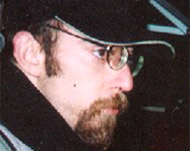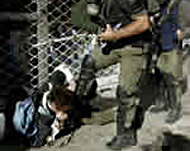Activist on hunger strike in Greek prison
Simon Chapman did not expect to be facing a quarter of a century in prison when he travelled to Thessaloniki to protest against the EU’s asylum laws.

But if the authorities there are successful in prosecuting him for making and using Molotov cocktails, causing criminal damage and attacking the police, the thirty-year-old Briton could spend the rest of his adult life behind bars.
On Sunday 5 October, Simon began a hunger strike to protest the denial of his applications for bail. Six other prisoners arrested at the same demonstration outside the EU summit in Thessaloniki last June have also refused food.
“It’s not so unusual to have innocent people in custody in Greece,” said Simon’s lawyer George Ververis. “It has happened several times here, not once.”
“But the evidence in this case is obvious and overwhelming. Our problem is that it is difficult to get prosecutors to challenge the written statements of policemen.”
Since the Genovese anti-summit protests in 2001, anti-globalisation activists have often claimed to have been framed by brutal police forces. In this case, startling visual evidence of Simon’s innocence was handed in to the authorities two days after his arrest.
But it has not yet been ruled admissible.
Evidence ignored
Pictures of Simon’s arrest show him on the floor, wearing a blue and purple backpack, being kicked by a policeman. The backpack disappeared in subsequent photos of the day.
Shortly after the photograph was taken, the Greek television station ET3 filmed riot policemen opening a black backpack containing Molotov cocktails and stuffing a hammer inside. Officers then carried the backpack – which was by now leaking petrol – back across the road, where they dumped it on the pavement next to Simon.
 |
|
Friends insist Simon is incapable |
Speaking from his cell in Diavatas prison, Thessaloniki, Simon, who wears glasses, told Aljazeera.net, that he had been blinded by CS gas when he was arrested.
“I had lost contact with my friends and was trying to find some water to wash my eyes out when about five or six police officers jumped on me,” he said.
“They beat me on the floor for five minutes and then searched my light blue bag but all they found in it was a bottle of water. They then took me to the side of the road where an officer came up and dropped a black rucksack next to me.”
At first Simon says he thought they were just collecting debris from the road. However “when they started kicking me and saying ‘this is yours, this is yours’ and I was made to carry it, I realised I was being fitted up. There wasn’t very much I could do about it.”
After the incident, Simon was taken to hospital where he needed stitches to the head for the injuries he sustained. Today he is still angry about his treatment and determined to see through his hunger strike until the virtue of his case is recognised.
Disbelief
“The evidence has been in the hands of the justice system since two days after my arrest,” he said, “so I find it hard to see how they can maintain that I was in possession of the black bag, when all the evidence shows I wasn’t.”
A friend who travelled to Thessaloniki with him insists Simon’s innocence.
“I know for a fact that Simon didn’t take any Molotovs to the protest, because I saw him packing his bag that morning. He put pants, socks and one change of clothing into it. I saw nothing that could have been used in any way for violence,” the friend says.
“Simon is an incredibly caring person,” he continued. “He was angry about the EU’s racist asylum laws, but he’s a sweet and compassionate human being, opposed to the taking of any life. I felt sick to the pit of my stomach when I heard that he’d been arrested.”
Uncertain Future
Even so, Simon has been denied bail, or leave to appeal and if a council of judges does not overturn the ruling in the next few weeks, he could be incarcerated for the 14 months it could take his case to come to trial.
“It is for the courts to decide if Chapman was innocent or guilty,” a spokesman for the Greek embassy told Aljazeera.net.
 |
|
Simon was beaten by the police |
“I don’t think this case will have any effect on our human rights record. There is fair play in the Greek justice system, not only for Simon but for everyone who was arrested.”
Simon’s supporters say that the reluctance of the judge to look at relevant evidence suggests that the Greek justice system does not always play fair. But the embassy spokesman was adamant.
“I think the judges saw everything,” he said. “I can’t believe they wouldn’t look at all the evidence. I’m sure they did. This is what happens in Greece.”
Shared fears
One of the protestors arrested at the same time as Simon, a 35-year-old Syrian artist called Suleiman Dadouk, is worried about what will happen if he is deported from Greece. He has been on hunger strike since 21 September.
Suleiman claims to have been arrested as he handed out leaflets during the protest, but he is facing similar charges to Simon. His lawyer, Efi Telly, is concerned about his future welfare.
“Suleiman has no permit to stay in Greece so it is likely that he will be deported to Syria, where he believes his life would be in danger,” she said.
“He refused to serve in the military there and I think that he would definitely be imprisoned if he goes back.”
“It could be bad for me,” Suleiman said over a crackling phone line from Diavatas prison. “You don’t know what might happen to you there. Syria is not a democratic country. It’s different from Europe, and I have problems with the system there.”
According to his lawyer, the only evidence of Suleiman’s guilt is “a policeman who said he saw him destroying things. But on demonstrations in Greece, policemen will always say this, even if they didn’t see it.”
Simon summed up the frustration of the anti-globalisation prisoners. “The Greek justice system doesn’t seem to be taking an interest in the particulars of our cases,” he said.
“We are being held responsible for everything that happened on that day because we were arrested on the day, and Molotov cocktails were found on the day. Whether we actually did anything or not seems to be irrelevant.”